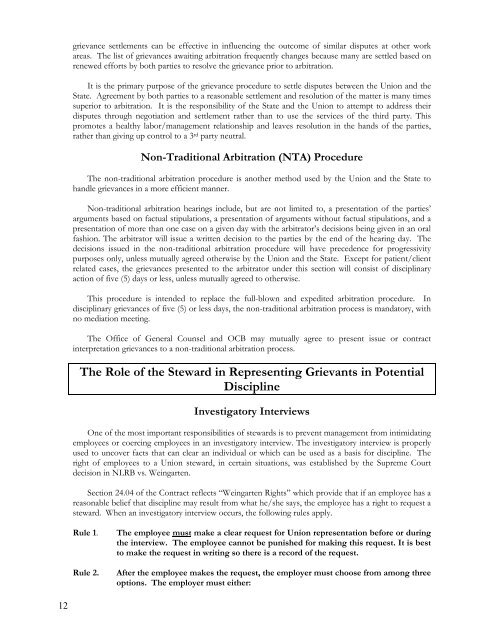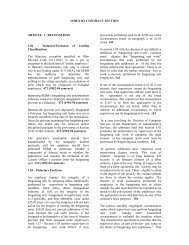Download the Grievance Guide - OCSEA
Download the Grievance Guide - OCSEA
Download the Grievance Guide - OCSEA
Create successful ePaper yourself
Turn your PDF publications into a flip-book with our unique Google optimized e-Paper software.
grievance settlements can be effective in influencing <strong>the</strong> outcome of similar disputes at o<strong>the</strong>r work<br />
areas. The list of grievances awaiting arbitration frequently changes because many are settled based on<br />
renewed efforts by both parties to resolve <strong>the</strong> grievance prior to arbitration.<br />
It is <strong>the</strong> primary purpose of <strong>the</strong> grievance procedure to settle disputes between <strong>the</strong> Union and <strong>the</strong><br />
State. Agreement by both parties to a reasonable settlement and resolution of <strong>the</strong> matter is many times<br />
superior to arbitration. It is <strong>the</strong> responsibility of <strong>the</strong> State and <strong>the</strong> Union to attempt to address <strong>the</strong>ir<br />
disputes through negotiation and settlement ra<strong>the</strong>r than to use <strong>the</strong> services of <strong>the</strong> third party. This<br />
promotes a healthy labor/management relationship and leaves resolution in <strong>the</strong> hands of <strong>the</strong> parties,<br />
ra<strong>the</strong>r than giving up control to a 3 rd party neutral.<br />
Non-Traditional Arbitration (NTA) Procedure<br />
The non-traditional arbitration procedure is ano<strong>the</strong>r method used by <strong>the</strong> Union and <strong>the</strong> State to<br />
handle grievances in a more efficient manner.<br />
Non-traditional arbitration hearings include, but are not limited to, a presentation of <strong>the</strong> parties’<br />
arguments based on factual stipulations, a presentation of arguments without factual stipulations, and a<br />
presentation of more than one case on a given day with <strong>the</strong> arbitrator’s decisions being given in an oral<br />
fashion. The arbitrator will issue a written decision to <strong>the</strong> parties by <strong>the</strong> end of <strong>the</strong> hearing day. The<br />
decisions issued in <strong>the</strong> non-traditional arbitration procedure will have precedence for progressivity<br />
purposes only, unless mutually agreed o<strong>the</strong>rwise by <strong>the</strong> Union and <strong>the</strong> State. Except for patient/client<br />
related cases, <strong>the</strong> grievances presented to <strong>the</strong> arbitrator under this section will consist of disciplinary<br />
action of five (5) days or less, unless mutually agreed to o<strong>the</strong>rwise.<br />
This procedure is intended to replace <strong>the</strong> full-blown and expedited arbitration procedure. In<br />
disciplinary grievances of five (5) or less days, <strong>the</strong> non-traditional arbitration process is mandatory, with<br />
no mediation meeting.<br />
The Office of General Counsel and OCB may mutually agree to present issue or contract<br />
interpretation grievances to a non-traditional arbitration process.<br />
The Role of <strong>the</strong> Steward in Representing Grievants in Potential<br />
Discipline<br />
Investigatory Interviews<br />
One of <strong>the</strong> most important responsibilities of stewards is to prevent management from intimidating<br />
employees or coercing employees in an investigatory interview. The investigatory interview is properly<br />
used to uncover facts that can clear an individual or which can be used as a basis for discipline. The<br />
right of employees to a Union steward, in certain situations, was established by <strong>the</strong> Supreme Court<br />
decision in NLRB vs. Weingarten.<br />
Section 24.04 of <strong>the</strong> Contract reflects “Weingarten Rights” which provide that if an employee has a<br />
reasonable belief that discipline may result from what he/she says, <strong>the</strong> employee has a right to request a<br />
steward. When an investigatory interview occurs, <strong>the</strong> following rules apply.<br />
Rule 1.<br />
Rule 2.<br />
The employee must make a clear request for Union representation before or during<br />
<strong>the</strong> interview. The employee cannot be punished for making this request. It is best<br />
to make <strong>the</strong> request in writing so <strong>the</strong>re is a record of <strong>the</strong> request.<br />
After <strong>the</strong> employee makes <strong>the</strong> request, <strong>the</strong> employer must choose from among three<br />
options. The employer must ei<strong>the</strong>r:<br />
12

















